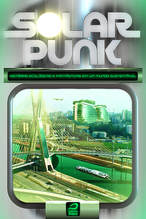 Gerson Lodi-Ribeiro is a Brazilian writer and editor, and he's the one behind the world's first anthology of "solarpunk" stories—optimistic, ecologial science fiction. Solarpunk: Histórias ecológicas e fantásticas em um mundo sustentável was released in Brazil in 2012, and we'll be publishing an English translation of it in 2018. If you haven't been following our Kickstarter to fund the translation of Solarpunk into English, please check it out here. WWP Editor-in-Chief Sarena Ulibarri asked Gerson some questions about solarpunk. Sarena Ulibarri: Solarpunk was the third of an anthology series: first Vaporpunk (steampunk), then Dieselpunk. Why did you decide to do “Solarpunk” for the third one? Why not Cyberpunk, or Biopunk, or some other vision of the future? Gerson Lodi-Ribeiro: Well, I guess that after polluting Brazilian’s fantastic literature biosphere, burning first coal to produce steam (Vaporpunk) and then petroleum into internal combustion engines (Dieselpunk), it was the right time to write stories in self-sustaining fictional civilizations — no matter if those were located in future Earths or alternate history timelines — greener and more inspiring futures or timelimes not troubled by pollution, overpopulation, famine, mass extinctions and anthropogenic global warming. After all, as a reader, I was feeling rather bored myself with all those old dystopian plots. Of course, it meant a hard challenge for many Brazilian and Portuguese science fiction authors to write stories about fairly wise characters living in civilizations more mature than ours. It really seems more difficult to write an interesting and loving piece of original fiction inside a greener future or alternate history. The characters living in those alternate or future scenarios should still face and overcome their own conflicts and dilemmas, live their own human drama. Because, in literary terms, aseptic utopias use to be very dull. So, although Solarpunk narratives are usually not dystopic (at least, as compared to average conventional science fiction ones), they are not exactly utopic either. Many of them are ecotopias. That was the main reason why we chose a greenpunk thematic of sorts, instead of a more conventional one, like Cyberpunk or Biopunk. SU: What does the “punk” in solarpunk mean to you? GLR: The “punk” suffix in any X-punk genre (Cyber, Steam, Diesel, Bio et cetera) means the gathering of the elements of counterculture as an anti-establishment cultural phenomenon. In the specific case of the Solarpunk (and other branches of ecofiction), these punk elements oppose an establishment represented by corrupt governments and megacorps that pollute Earth’s ecosystems, ruin our biosphere, and refuse to assume their responsibility for the anthropogenic global warming. SU: Do contemporary Brazilian/Portuguese science fiction writers tend to write dark and grim, or are there some authors writing more hopeful futures? Are any of them writing what you would consider solarpunk? GLR: Lusophone (Brazilian + Portuguese) science fiction authors do tend to write dark and grim future narratives, as much as their foreign counterparts do, just because to write about pessimistic futures is easier. As I said above, it is more difficult to create a convincing science fiction story inside a greener future or alternate scenarios. For, if there were no more famine, misery, war, pollution et cetera, where the heck is the conflict and the drama to advance the plot after all? How challenging was this solarpunk writing task? Well, we had rather fewer submissions to Solarpunk than either to Vaporpunk or to Dieselpunk. Now, if we consider that, contrarily to Steampunk and Dieselpunk narratives, Solarpunk ones can be straightforward science fiction (and not only an alternate history plot of sorts), we see how hard is to create dilemma in a greener future society. On the other hand, many far future narratives are Solarpunk, even if only in a broad sense, as their authors propose mature post-scarcity human civilizations, which means humanity has overcome its present crises, both as a civilization and as a species. Indeed, there are fictional narratives written by Lusophone authors that can be read as Solarpunk. They have elements of Solarpunk in their worldbuilding and express concepts associated with that literary and cultural movement. However, we do not have authors writing Solarpunk stories and novels in a consistent way right now.  Cover for the original Brazilian Portuguese edition. Cover for the original Brazilian Portuguese edition. SU: What do you most hope to see in new books and stories following the solarpunk tradition? GLR: Both as an anthologist and as a reader, I would like to see a lot more optimist & greener future narratives. Even knowing it is not so easy to create dilemma and human drama inside post-scarcity mature and less Manichaean cultures, it would be lovely to read a greater number of those ecotopic science fictional scenarios. SU: What new projects are you working on right now, either as an editor or an author? GLR: As an editor, I just delivered an anthology of alternate history stories to Draco (the same Brazilian publishing house that launched Solarpunk: Histórias ecológicas e fantásticas em um mundo sustentável in Portuguese in 2012). It will be probably published in 2018. As an author, I am happy, because my far future novel Octopusgarden will be launched in Rio de Janeiro Book Fair next September. It is a prequel of sorts of another novel of mine, A Guardiã da Memória (The Guardian of Memory, Draco 2011), which won Brazilian science fiction Argos Awards in 2012, in the Best Novel category. By the way, presently, I am writing the third novel in a trilogy written in the same fictional universe of The Guardian of Memory and Octopusgarden.  Gerson Lodi-Ribeiro had two novelettes published in Brazilian Asimov’s: hard SF “Mythic Aliens” and “The Ethics of Treason”, the latter was the first alternative history story in Brazilian and Portuguese science fiction. His alternative history novelette “The Vampire of New Holland” won the Nova Awards 1996, while his SF novelette “The Daughter of the Predator” won the Nautilus 1999. His main short fiction collections are: Other Histories…, The Vampire of New Holland, Other Brazils, Taikodom: Chronicles and The Best of Carla Cristina Pereira. Gerson has published four novels so far: Xochiquetzal: An Aztec Princess Among the Incas, The Guardian of Memory, The Adventures of the Vampire of Palmares and Strangers in Paradise. He has edited eight short fiction anthologies so far: Phantastica Brasiliana, How Lustful my Alien Girl Was!, Vaporpunk, Dieselpunk, Solarpunk, Fantastic Erotica 1, Super-Heroes, and Dinosaurs. Beyond the science fiction borders, he published Vita Vinum Est!: History of Wine in the Roman World.
0 Comments
Your comment will be posted after it is approved.
Leave a Reply. |
World Weaver PressPublishing fantasy, paranormal, and science fiction. Archives
February 2024
|
- Home
-
Books
-
All Books
>
- Beyond the Glass Slipper
- Bite Somebody
- Bite Somebody Else
- Black Pearl Dreaming
- Cassandra Complex
- Causality Loop
- Clockwork, Curses, and Coal
- Continuum
- Corvidae
- Cursed: Wickedly Fun Stories
- Dream Eater
- Equus
- Fae
- Falling of the Moon
- Far Orbit
- Far Orbit Apogee
- Fractured Days
- Frozen Fairy Tales
- Glass and Gardens: Solarpunk Summers
- Glass and Gardens: Solarpunk Winters
- Grandmother Paradox
- Grimm, Grit, and Gasoline
- Haunted Housewives
- Heir to the Lamp
- He Sees You When He's Creepin': Tales of Krampus
- Into the Moonless Night
- Jack Jetstark's Intergalactic Freakshow
- King of Ash and Bones (ebook)
- Krampusnacht
- Last Dream of Her Mortal Soul
- Meddlers of Moonshine
- Mothers of Enchantment
- Mrs Claus
- Multispecies Cities
- Murder in the Generative Kitchen
- Recognize Fascism
- Scarecrow
- Sirens
- Shards of History
- Shattered Fates
- Skull and Pestle
- Solarpunk (Translation)
- Solarpunk Creatures
- Solomon's Bell
- SonofaWitch!
- Speculative Story Bites
- Trenchcoats, Towers, and Trolls
- Weredog Whisperer
- Wolves and Witches
- Anthologies and Collections
- Novels
- Novellas
- Fairy Tale
- Fantasy
- Romance
- Science Fiction
- Urban/Contemporary Fantasy
- Young Adult SFF
-
All Books
>
- Blog
- About
- Contact
- Press / Publicity
- Newsletter Signup
- Privacy Policy
- Store

 RSS Feed
RSS Feed